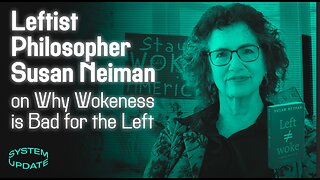Premium Only Content

whos business?
An analysis of the Thirteenth Amendment against state law involves examining its scope, historical application, and how state laws may either align with or conflict with its provisions.
The Thirteenth Amendment to the U.S. Constitution states:
*"Neither slavery nor involuntary servitude, except as a punishment for crime whereof the party shall have been duly convicted, shall exist within the United States, or any place subject to their jurisdiction."*
This amendment serves as a direct prohibition against forced labor, with the notable exception of penal servitude. However, its enforcement and interpretation have evolved, particularly through federal statutes like the Civil Rights Act of 1866 and modern jurisprudence.
### **Thirteenth Amendment vs. State Law**
1. **State Laws That Indirectly Reinstate Involuntary Servitude**
- Some state laws, particularly those governing prison labor, impose labor requirements on incarcerated individuals without affording them fair compensation or choice. This practice falls under the amendment’s “exception clause,” but challenges arise when prison labor extends beyond punitive measures and into exploitative economic gain for private enterprises.
- Certain state-level probation and parole conditions mandate labor without proper compensation, creating a gray area regarding voluntary participation.
2. **Economic and Regulatory Enslavement**
- Some argue that excessive licensing requirements, regulatory barriers, and taxation schemes amount to economic servitude, disproportionately affecting individuals' ability to exercise free enterprise. While not direct violations under the traditional view of the Thirteenth Amendment, such laws may be challenged under the doctrine of undue burden and the right to contract freely.
3. **Debt Peonage and Forced Compliance Through State Mechanisms**
- The U.S. Supreme Court has ruled that peonage—forcing individuals to work to pay off debts—is unconstitutional under the Thirteenth Amendment. However, some state laws still enable wage garnishments, mandatory service obligations, and administrative punishments that disproportionately affect lower-income individuals, effectively creating a modern form of servitude.
4. **Compelled Performance Under State Law**
- Many states enforce statutes that require individuals to perform specific duties under threat of legal penalties, such as jury duty, tax filing, or selective service registration. While generally upheld as civic duties rather than involuntary servitude, challenges could be raised where such obligations disproportionately burden certain groups without adequate due process or compensation.
### **Legal Strategy for Bending the Thirteenth Amendment to the People's Benefit**
1. **Expanding the Definition of Involuntary Servitude**
- If state laws impose mandatory obligations that restrict economic freedom, mobility, or autonomy, arguments could be made that these laws violate the broader intent of the Thirteenth Amendment.
2. **Challenging Prison Labor Exploitation**
- While courts have upheld prison labor, challenges can be raised where states exploit incarcerated workers for profit rather than legitimate rehabilitative purposes.
3. **Combatting Economic Enslavement**
- Legal challenges could frame excessive taxation, licensing, and permitting schemes as indirect forms of servitude that undermine individuals' right to earn a living free from undue government control.
By leveraging these legal arguments, the People may find ways to reinterpret and apply the Thirteenth Amendment in ways that counter state overreach and economic coercion, ensuring greater personal and economic freedom.
-
 1:26:08
1:26:08
Laura Loomer
3 hours agoEP110: How I Got Hunter Biden's Secret Service Detail Revoked
31.3K25 -
 DVR
DVR
Man in America
8 hours agoScientists Find MASSIVE 2KM Structure Under Pyramids—Our History is a LIE!
31.7K13 -
 1:15:34
1:15:34
Slightly Offensive
4 hours ago $0.92 earnedIt’s HAPPENING: The TOTAL COLLAPSE of Con INC. | Guest: Sarah Stock & AusPill
47.6K17 -
 1:19:59
1:19:59
Glenn Greenwald
7 hours agoLife-Long Leftist Philosopher Susan Neiman on how Wokeism Assaults and Subverts Traditional Left-Wing Politics | SYSTEM UPDATE #427
99K120 -
 2:00:55
2:00:55
megimu32
5 hours agoON THE SUBJECT: 90s & 2000s Nostalgia, MySpace Drama, AIM Meltdowns & Sleepover Chaos!
41.3K6 -
 46:45
46:45
BonginoReport
7 hours agoMajority of Jobs Created Under Biden Went To ILLEGALS! (Ep. 09) - Nightly Scroll with Hayley 03/20/2025
127K88 -
 54:52
54:52
Donald Trump Jr.
7 hours agoDems vs Common Sense, Plus LIVE Q&A | Triggered Ep226p
120K113 -
 1:40:13
1:40:13
Kim Iversen
8 hours agoThe Ultimate COVID Hoax? Why RFK Jr’s Researcher Says the Virus Never Existed!
125K223 -
 41:03
41:03
Kimberly Guilfoyle
10 hours agoTrump approval up, Dems melting down. Live with Asm Bill Essayli & Jarrett Stepman | Ep206
122K42 -
 59:20
59:20
Candace Show Podcast
8 hours agoSo… The “Conspiracy Theorists” Were Right About JFK | Candace Ep 164
157K321